A strong WordPress site needs a well-maintained database. Every time a visitor comments, every post published, and every form submission gets stored in your WordPress database. Over time, this accumulation of data can slow down your site if not properly managed.
Database management is crucial for WordPress websites. WordPress powers 45.8% of all websites on the internet today. Each of these sites relies on a database to function correctly. When that database becomes bloated or corrupted, it can lead to slower loading times, errors, and even complete site failure.
In this post, we’ll share the five WordPress database plugins we install on client sites. These tools help maintain optimal database performance, provide essential backups, and offer important functionality that benefits both site owners and visitors.
What is a WordPress Database Plugin and Why You Need One
WordPress stores all your important site information in a database – posts, pages, comments, user information, plugin settings, and more. This database is the foundation of your website, but without proper maintenance, it can become bloated with unnecessary data.
Database plugins help manage, optimize, and protect this vital component of your WordPress site. They perform various functions from cleaning up unnecessary data to creating backups and facilitating migrations.
Among the vast WordPress plugin ecosystem with over 60,300 plugins available, database plugins serve several critical purposes:
- Database cleanup and optimization to improve site speed
- Regular automated backups to prevent data loss
- Table repair when database corruption occurs
- Data migration when moving to new servers
- Database search and replace operations
- Form data storage and management
Without proper database management, websites often suffer from poor performance, frequent errors, and potential data loss. The plugins we’re about to discuss help prevent these issues by maintaining a healthy, optimized database structure.
How We Choose the Right Database Plugins for Our Clients
When selecting database plugins for client sites, we focus on solutions that are reliable, user-friendly, and provide tangible benefits. Our selection criteria prioritize plugins that meet specific needs while being accessible to users with varying technical expertise.
A quality database plugin should offer clear benefits without requiring extensive database knowledge to operate. The interface should be intuitive enough for beginners while offering advanced capabilities for experienced users.
Here are the key factors we evaluate when selecting database plugins:
| Selection Criteria | Why It Matters |
|---|---|
| Ease of use | Clients need to be able to use the plugin without extensive training |
| Feature set | The plugin should offer comprehensive solutions for specific database needs |
| Update frequency | Regularly updated plugins ensure compatibility and security |
| Support quality | Access to help when issues arise is essential |
| Performance impact | The plugin should improve, not hinder, website performance |
| Compatibility | Must work well with other WordPress plugins and themes |
With these criteria in mind, we’ve identified five database plugins that consistently deliver excellent results across different client websites. Each plugin serves a specific purpose in our WordPress maintenance toolkit, addressing distinct aspects of database management.
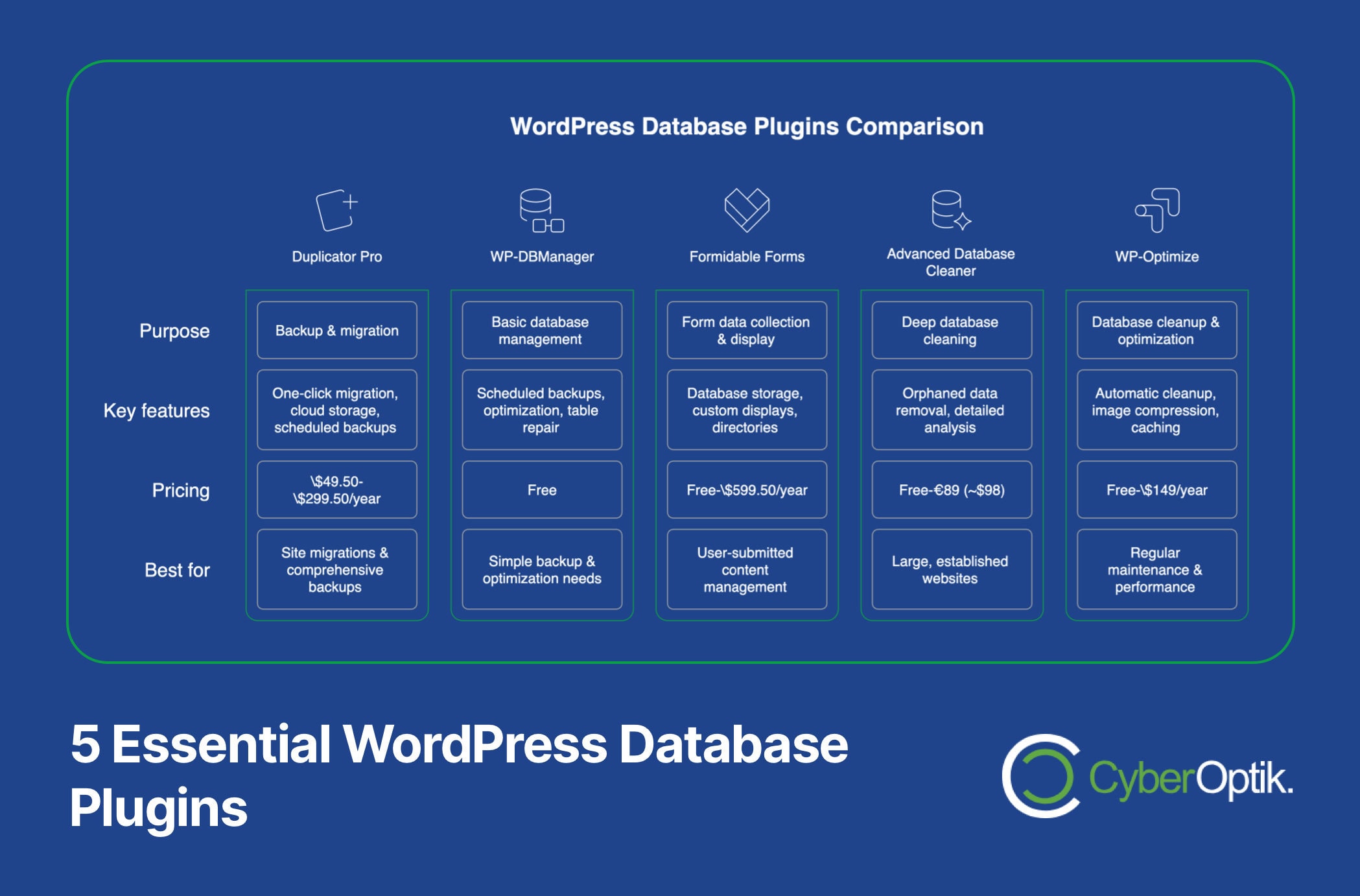
Plugin #1: Duplicator Pro
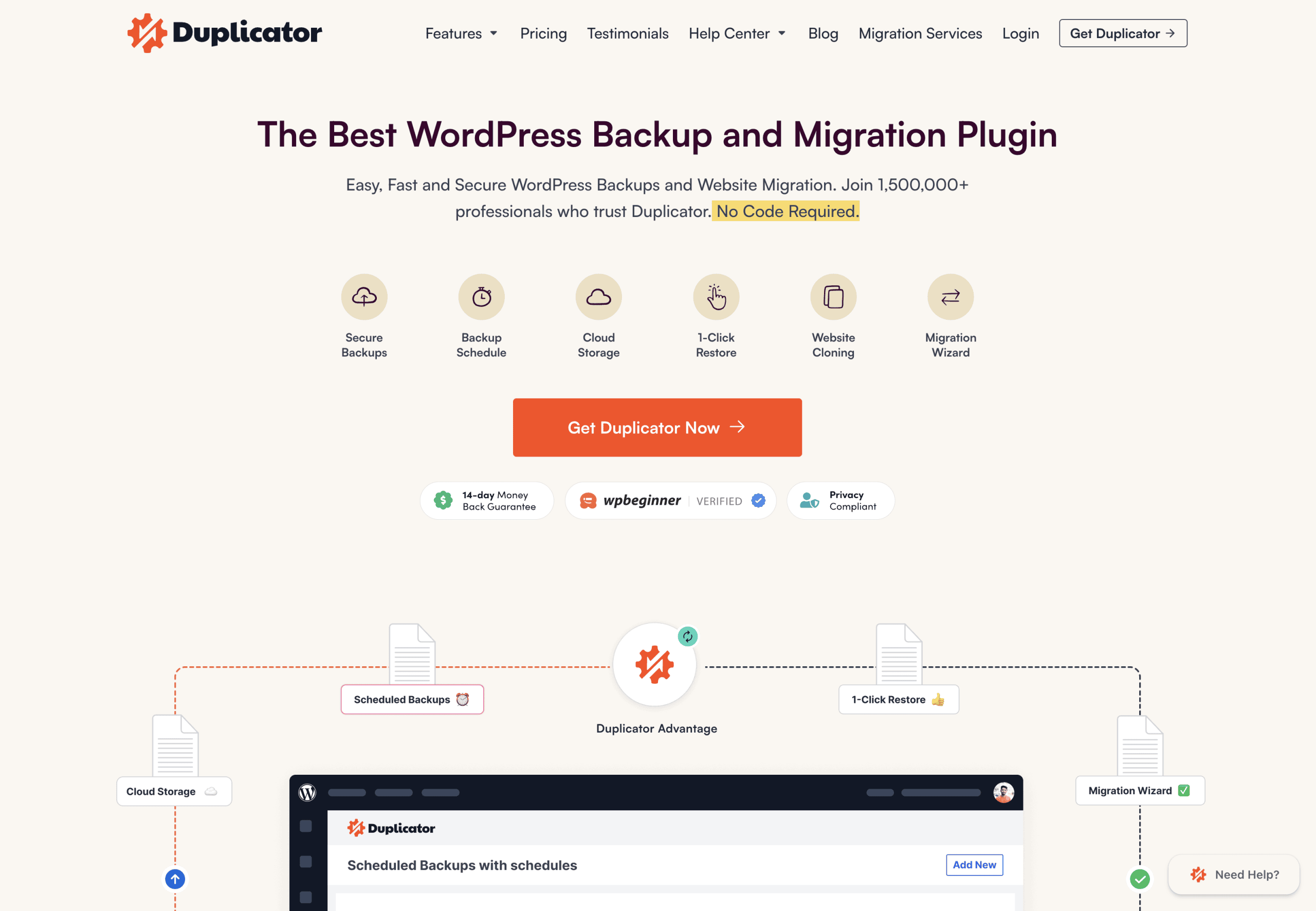
Duplicator Pro stands out as our primary solution for database backups and migrations. This powerful plugin creates complete copies of WordPress sites, including the database, and allows for seamless transfer to new locations.
Key Features of Duplicator Pro
Duplicator Pro combines robust backup capabilities with migration tools, making it indispensable for website management. The plugin simplifies what would otherwise be complex technical tasks.
- One-click migration of entire WordPress sites
- Cloud storage integration (Dropbox, Google Drive, OneDrive)
- Scheduled automated backups
- Database table filtering
- Multisite support
- Email notifications for backup status
Why We Install Duplicator Pro for Clients
Migration and backup capabilities are essential for any WordPress site. Duplicator Pro provides a straightforward solution for both, allowing us to easily move sites between development, staging, and production environments.
The plugin’s cloud storage integration ensures backups are stored securely off-site, protecting against server failures. This feature has saved many websites during hosting issues or after accidental data deletion.
Database migrations can be complex, but Duplicator Pro simplifies the process with its intuitive interface. Even large databases with complicated structures can be moved efficiently, saving hours of manual work.
Duplicator Pro Pricing
| Plan | Price | Sites | Features |
|---|---|---|---|
| Personal | $49.50/year | 3 sites | Core features |
| Freelancer | $89.50/year | 15 sites | + Priority support |
| Business | $169.50/year | Unlimited | + Advanced features |
| Gold | $299.50/year | Unlimited | Lifetime updates |
A free version of Duplicator is also available with limited functionality, suitable for basic migrations.
Pros and Cons of Duplicator Pro
Understanding the strengths and limitations of Duplicator Pro helps in making informed decisions about its use.
Pros:
- Extremely reliable for site migrations
- User-friendly interface for complex operations
- Excellent compatibility with various hosting environments
- Regular updates and active development
- Cloud storage integration
Cons:
- Premium version required for advanced features
- Large sites may require server adjustments for successful migrations
- Can be resource-intensive during the backup process
Plugin #2: WP-DBManager
WP-DBManager provides a straightforward approach to database management with its focus on backup, restoration, and optimization. This free plugin offers essential functionality without overwhelming users with complex options.
Key Features of WP-DBManager
Despite being free, WP-DBManager includes a robust set of features that covers most database management needs.
- Scheduled database backups
- Email notifications for backup status
- Database optimization
- Database restoration from backup
- Repair database tables
- Execute SQL queries
Why We Install WP-DBManager for Clients
For clients who need a simple, reliable solution for database backups and basic optimization, WP-DBManager offers the perfect balance of functionality and usability. Its straightforward interface makes it accessible even to clients with limited technical knowledge.
The scheduled backup feature ensures regular database copies are created automatically, providing peace of mind without requiring manual intervention. This automation is particularly valuable for clients who may forget to perform regular backups themselves.
WP-DBManager also helps maintain database health through its optimization features. Regular optimization can reduce database bloat and improve site performance with minimal effort.
WP-DBManager Pricing
| Plan | Price | Features |
|---|---|---|
| Free | $0 | All features included |
WP-DBManager is completely free with no premium version or paid upgrades, making it an excellent choice for budget-conscious clients.
Pros and Cons of WP-DBManager
As with any tool, WP-DBManager has both strengths and limitations to consider.
Pros:
- Completely free with no premium version required
- Lightweight with minimal performance impact
- Simple, straightforward interface
- Reliable scheduled backups
- Long history of development and updates
Cons:
- Fewer advanced features compared to premium alternatives
- Limited backup storage options
- Basic interface may lack visual polish
- No direct cloud storage integration
Plugin #3: Formidable Forms
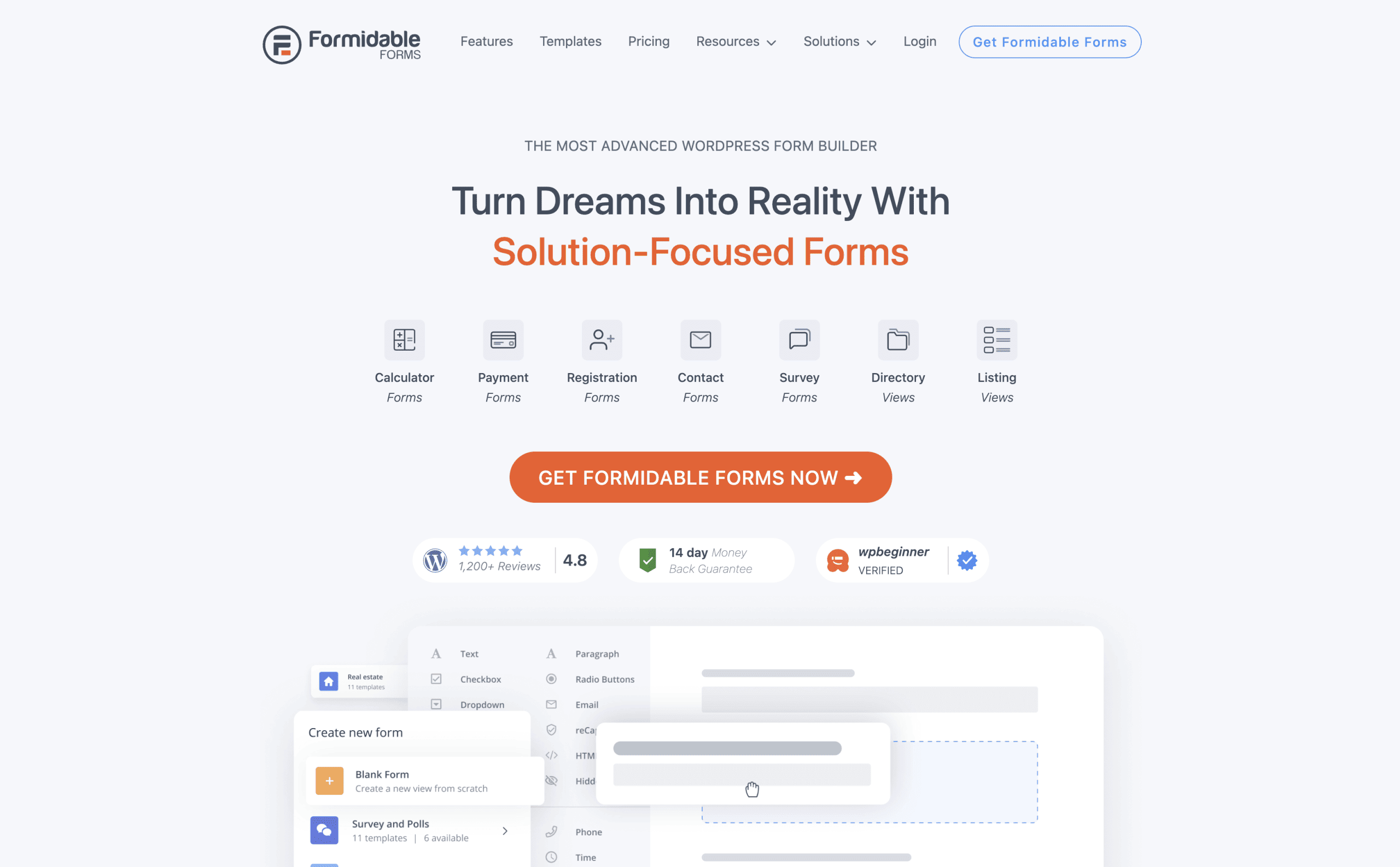
While primarily known as a form builder, Formidable Forms earns its place on our essential database plugins list by providing powerful database functionality for form submissions. It transforms WordPress into a robust database management system for user-submitted content.
Key Features of Formidable Forms
Formidable Forms excels at both collecting data through forms and creating meaningful displays of that information.
- Advanced form building with database storage
- Displays form data in tables, graphs, and custom layouts
- Creates searchable directories and listings from form data
- User-facing filters and search capabilities
- Data import and export functionality
- Conditional logic for data management
Why We Install Formidable Forms for Clients
Many client websites need to collect, store, and display user-submitted information. Formidable Forms bridges the gap between form collection and database management, creating a seamless system for handling this data.
The plugin’s Views feature allows us to display form submissions in formatted directories, listings, or other custom layouts. This functionality transforms simple forms into powerful tools for creating dynamic, user-generated content sections.
What happens to form data after collection is a critical consideration for any website. Formidable Forms addresses this by creating organized database entries that can be easily searched, filtered, and displayed.
Formidable Forms Pricing
| Plan | Price | Sites | Features |
|---|---|---|---|
| Free | $0 | Unlimited | Basic forms |
| Basic | $99.50/year | 1 site | + Business features |
| Plus | $199.50/year | 3 sites | + Advanced features |
| Business | $399.50/year | Unlimited | + Views & Reports |
| Elite | $599.50/year | Unlimited | All features & add-ons |
Pros and Cons of Formidable Forms
Understanding the strengths and limitations of Formidable Forms helps in determining if it’s the right solution for your database needs.
Pros:
- Transforms WordPress into a versatile database platform
- Intuitive drag-and-drop form builder
- Powerful display options for collected data
- Extensive documentation and support
- Regular updates and new features
Cons:
- Higher learning curve than simpler form plugins
- Most database features require premium versions
- Can be overkill for sites needing only basic forms
- Premium versions are relatively expensive
Plugin #4: Advanced Database Cleaner

Advanced Database Cleaner provides specialized tools for deep database cleaning and maintenance. This plugin goes beyond basic optimization to address orphaned data, unused tables, and other database issues that can accumulate over time.
Key Features of Advanced Database Cleaner
The plugin offers a comprehensive set of tools specifically designed for thorough database maintenance.
- Identifies and removes orphaned database entries
- Cleans up post revisions, auto-drafts, and trash items
- Optimizes database tables
- Scheduled cleaning and optimization
- Multisite support
- Detailed analysis of database tables
Why We Install Advanced Database Cleaner for Clients
For larger WordPress sites that have been operating for years, database bloat becomes a significant issue. Advanced Database Cleaner helps identify and remove unnecessary data that other plugins might miss.
The plugin’s ability to analyze the database and provide detailed reports helps us make informed decisions about what can be safely removed. This targeted approach prevents accidental deletion of important data while still achieving significant optimization.
Many websites suffer from orphaned database entries left behind by previously installed plugins. Advanced Database Cleaner is particularly effective at identifying and removing these abandoned tables and options, which can accumulate substantially over time.
Advanced Database Cleaner Pricing
| Plan | Price | Sites | Features |
|---|---|---|---|
| Free | $0 | Unlimited | Basic cleaning |
| Pro | €29 (approx. $32) | 1 site | All features |
| Pro Plus | €59 (approx. $65) | 5 sites | All features |
| Pro Agency | €89 (approx. $98) | Unlimited | All features |
Pros and Cons of Advanced Database Cleaner
Understanding the strengths and limitations of Advanced Database Cleaner helps in determining its suitability for your specific needs.
Pros:
- Thorough database analysis and cleaning
- Safe mode for reviewing before deletion
- Detailed reports on database status
- Identifies orphaned data from uninstalled plugins
- Small footprint with minimal performance impact
Cons:
- Most powerful features require the premium version
- Interface can be intimidating for beginners
- Analysis process can be time-consuming on large databases
- Requires careful review to avoid removing needed data
Plugin #5: WP-Optimize
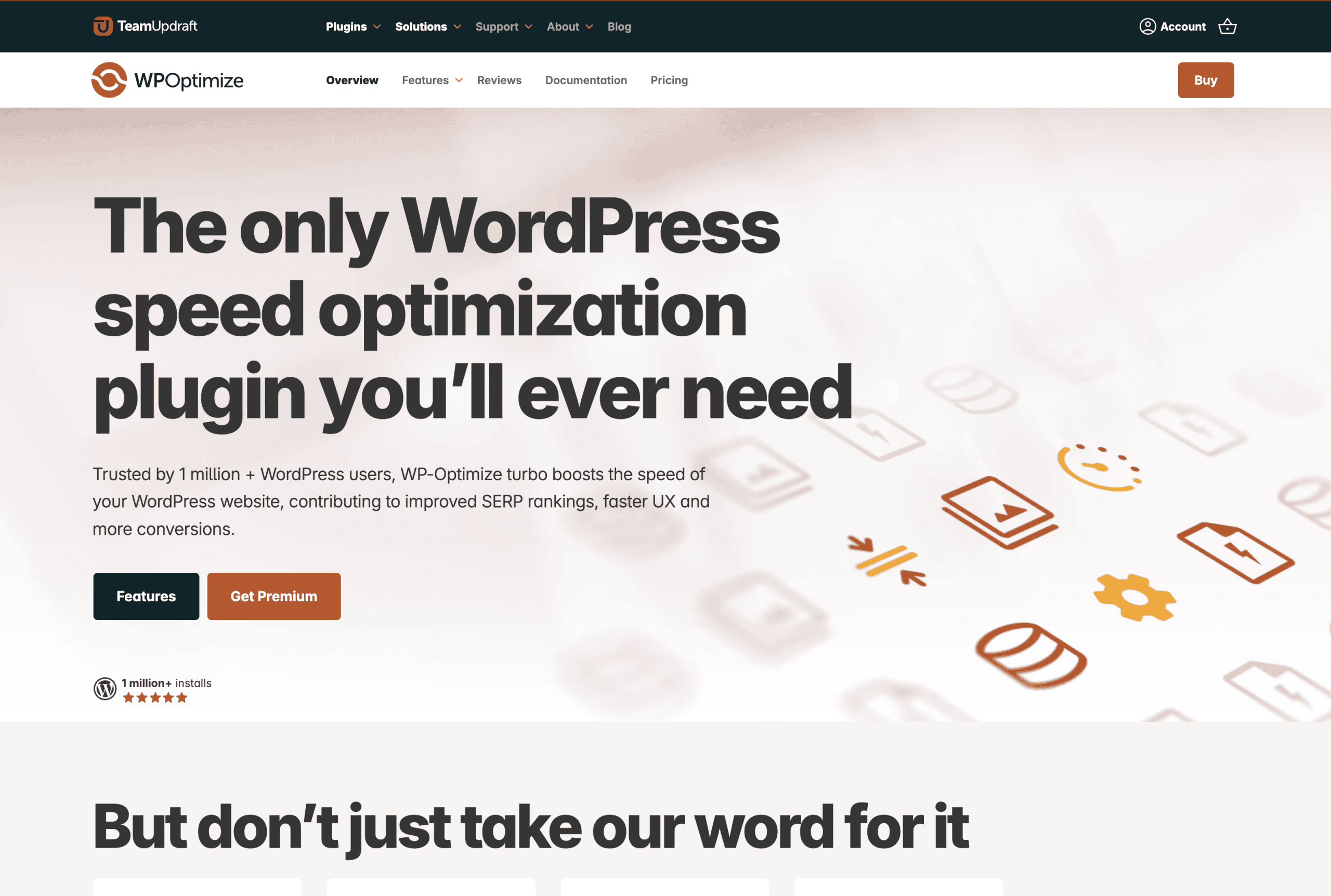
WP-Optimize is our go-to solution for database cleanup and optimization. This plugin helps maintain optimal database performance by removing unnecessary data and optimizing database tables.
Key Features of WP-Optimize
WP-Optimize combines multiple optimization functions into a single, user-friendly interface.
The plugin stands out with its comprehensive approach to WordPress optimization:
- Automatic cleanup of post revisions, spam comments, and transient options
- Database table optimization
- Image compression capabilities
- Caching functionality
- Scheduled cleanups and optimizations
- Multisite support
Why We Install WP-Optimize for Clients
Regular database maintenance is crucial for website health. WP-Optimize automates this process, ensuring client sites remain fast and efficient without manual intervention.
The plugin’s combination of database optimization, image compression, and caching makes it a versatile tool that addresses multiple performance factors. This comprehensive approach helps improve overall site speed and user experience.
By automatically cleaning up unnecessary data like spam comments, post revisions, and transient options, WP-Optimize prevents database bloat before it affects site performance. This proactive approach is more effective than waiting until performance issues become noticeable.
WP-Optimize Pricing
| Plan | Price | Sites | Features |
|---|---|---|---|
| Free | $0 | Unlimited | Basic optimization |
| Premium | $49/year | 1 site | All features |
| Premium 5 | $79/year | 5 sites | All features |
| Premium Unlimited | $149/year | Unlimited | All features |
Pros and Cons of WP-Optimize
As with any tool, WP-Optimize comes with both advantages and limitations.
Pros:
- All-in-one solution for database optimization, caching, and image compression
- User-friendly interface with detailed options
- Minimal server resource usage
- Effective at improving site speed
- Regular updates and active development
Cons:
- Some advanced features require the premium version
- Caching feature may conflict with certain hosting environments
- Requires careful configuration to avoid removing wanted content
How to Implement These Plugins Properly
Proper implementation of database plugins is crucial for maximizing their benefits while avoiding potential issues. Here are our recommendations for setting up and using these plugins effectively.
Best Practices for Installation and Setup
Before installing any database plugin, always create a complete backup of your website. This precautionary step ensures you can restore your site if anything goes wrong during the installation or configuration process.
We recommend installing these plugins one at a time rather than all at once. This approach allows you to test each plugin individually and identify any potential conflicts before adding another to the mix.
When configuring settings, start with conservative options before enabling more aggressive features. For example, with WP-Optimize, begin by cleaning only post revisions and spam comments before moving on to more extensive optimization options.
Configuration Recommendations for Each Plugin
Based on our experience implementing these plugins across numerous client sites, we’ve developed optimal configuration recommendations:
| Plugin | Recommended Configuration |
|---|---|
| Duplicator Pro | Set up automatic weekly backups to cloud storage |
| WP-Optimize | Schedule weekly cleanup of revisions, trash, and spam |
| WP-DBManager | Configure daily database backups with email notifications |
| Advanced Database Cleaner | Run monthly deep cleaning with review before deletion |
| Formidable Forms | Enable AJAX form submission and entry backup |
Common Mistakes to Avoid
When implementing database plugins, be aware of these common pitfalls that can lead to problems:
First, avoid scheduling too frequent optimizations. Daily database optimizations are rarely necessary and can actually add server load without providing significant benefits.
Second, be careful about deleting all post revisions. While they can contribute to database bloat, keeping at least 2-3 recent revisions provides valuable backup options if content needs to be restored.
Third, don’t assume your backups work without testing them. Regularly perform test restorations to ensure your backup process is functioning correctly.
Fourth, avoid running intensive operations during peak traffic hours. Schedule database tasks for low-traffic periods to minimize impact on site visitors.
Regular Maintenance Schedule
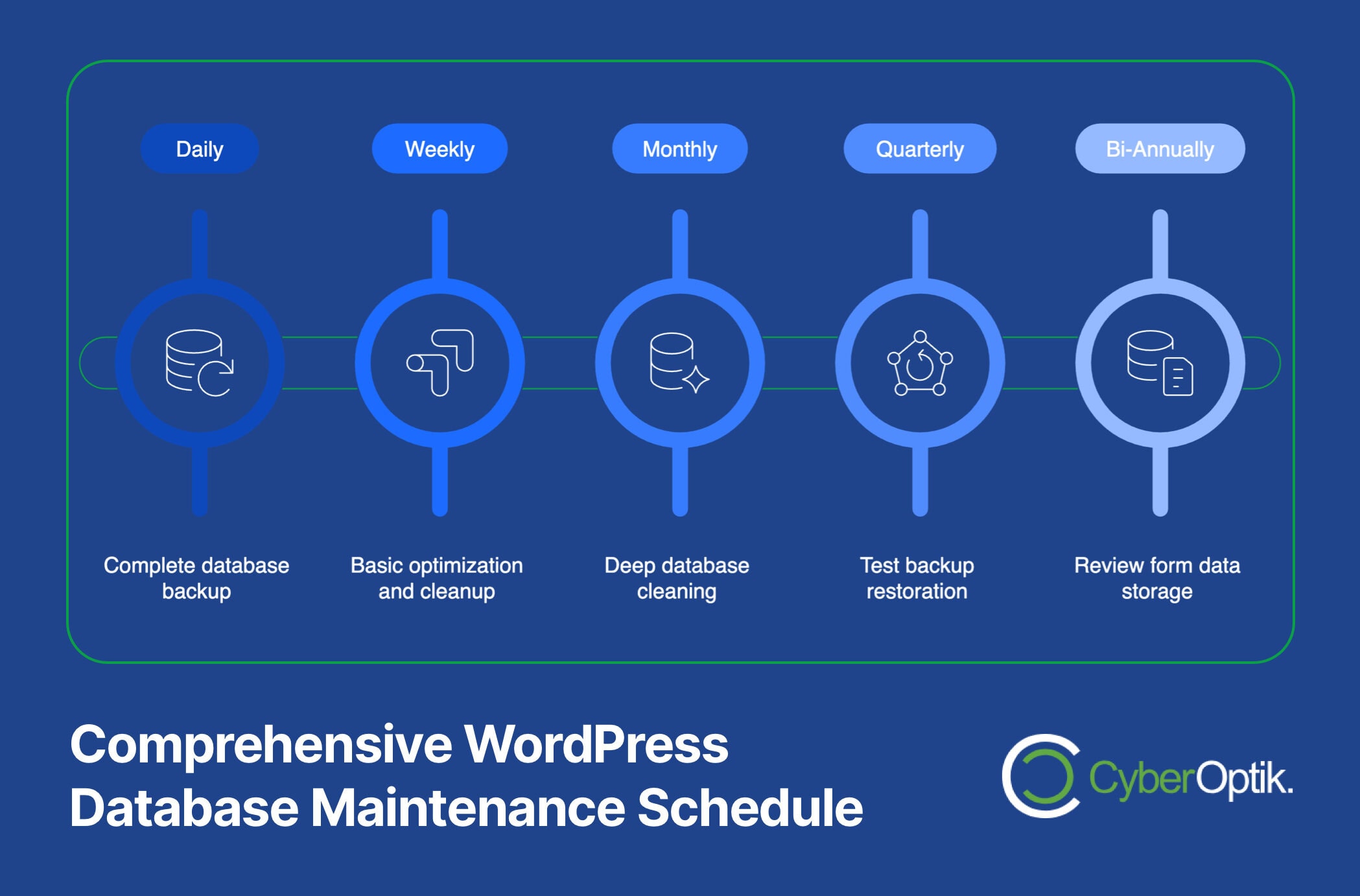
Establishing a regular maintenance schedule ensures your database remains optimized without requiring constant attention. Here’s our recommended maintenance timeline for most WordPress sites:
| Frequency | Task | Plugin |
|---|---|---|
| Daily | Database backup | Duplicator Pro or WP-DBManager |
| Weekly | Basic optimization | WP-Optimize |
| Monthly | Deep cleaning | Advanced Database Cleaner |
| Quarterly | Test backup restoration | Duplicator Pro |
| Biannually | Review form data storage | Formidable Forms |
Following this maintenance schedule helps ensure your database remains optimized while reducing the risk of data loss or performance issues.
Conclusion
Maintaining a healthy WordPress database is essential for website performance, security, and reliability. The five plugins we’ve covered – Duplicator Pro, WP-DBManager, Formidable Forms, Advanced Database Cleaner, and WP-Optimize – address different aspects of database management, creating a comprehensive solution when used together.
While each plugin offers distinct benefits, the combination provides a robust system for regular automated backups, optimization and cleanup, data collection and display, migration and cloning, and deep cleaning of orphaned data.
By implementing these plugins with the recommended configurations, you can ensure your WordPress database remains lean, efficient, and secure. This proactive approach prevents common issues like slow performance, data corruption, and unsuccessful updates or migrations.
Remember that database management is not a one-time task but an ongoing process. Regular maintenance using these tools will keep your WordPress site running smoothly and provide peace of mind knowing your valuable data is protected.
If you need assistance implementing these database solutions or want a professional assessment of your WordPress site’s performance, our team at CyberOptik is here to help. Contact us today to learn how our WordPress maintenance services can keep your site running at peak performance.




